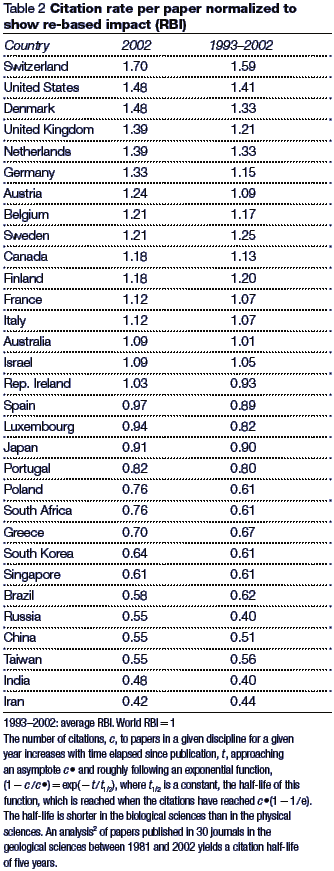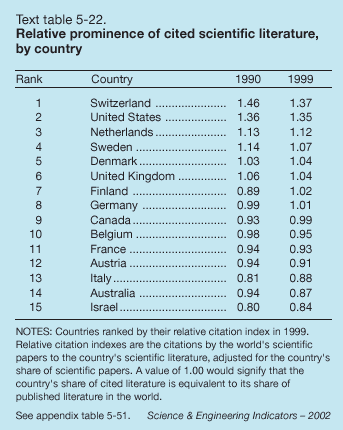 UK's
Chief Scientific Advisor, David King,
UK's
Chief Scientific Advisor, David King,
|
News & Views item - July 2004 |
![]()
 UK's
Chief Scientific Advisor, David King,
UK's
Chief Scientific Advisor, David King,
Coinciding with the Chancellor of the Exchequer, Gordon Brown's release of the 2004 Spending Review showing strong support for research and development Sir David King, in the July 15 issue of Nature, as Chief Scientific Advisor to H. M. Government and Head of the Office of Science and Technology discusses the scientific impact of nations. He is in fact following on from a 1997 assessment, The Scientific Wealth of Nations, published by his predecessor as UK science advisor, Robert May, in Science (1997). In that paper Professor May concluded:
[A]mong the scientifically advanced countries, better value for money (in terms of papers or citations per person or per dollar spent) might be associated with performing basic research mostly in universities, rather than in research institutes. If so, there are significant implications for those countries, such as the United Kingdom, Sweden, and Australia, which recently have seen great enlargement in the number of tertiary institutions designated as universities. It seems unlikely that governments can afford to supply the previously customary level of infrastructure for research (equipment, technicians, research libraries, properly furnished laboratories, and so on) to all departments in these more numerous universities. This raises questions about how to focus such infrastructure support and indirect costs upon the best people and groups. ... I think the alternative of hiving off most fundamental research into dedicated institutes could be a suboptimal solution. This issue deserves further analysis.
Now seven years later Professor King makes the point that:
[C]omparing citations between the United States and the EU15 [i.e. the 15 nations making up the EU prior to the acceptance of the ten nations recently added] shows that the gap between the two has shrunk significantly since May's analysis based on figures up to 1993. The EU now matches the United States in the physical sciences, engineering and mathematics, although it still lags in the life sciences. The United Kingdom's share of science citations remains second only to the United States, and in intensity heads up the listing of large nations.. Although many UK scientists campaigned against these cuts, they encouraged a level of resourcefulness among researchers, and approaches to industry and the EU that are now bearing fruit.
He then concludes:
It is important also to recognize the role played in European science by the smaller northern countries, all of which rate highly in science intensity. Thus, taking Belgium, Denmark, Finland, the Netherlands, Sweden and Switzerland together, with a total population of 53 million, in 1997–2001 this group generated 12.7% of the most cited papers, putting them in the same bracket as the United Kingdom (12.8%) and Germany (10.4%). Since the combined GDP of these countries is marginally (6%) smaller than the United Kingdom, their combined science citation intensity is higher.
A strong science base need not lead directly to wealth generation. For instance, although the strength of the UK science base has long been acknowledged, it has only recently begun to translate this into the development of high-tech clusters accompanying knowledge transfer between higher education and industry. However, strength in science has additional benefits for individual nations, and for the world as a whole. From global terrorism and the spread of disease to the dangers of global warming, we are increasingly facing the sorts of threats for which governments everywhere will need to turn to their scientists.
 The greater
part of the analysis concentrates on
the EU 15 -- comparing them with one another and with the United States -- using
what might be termed disciplinary 'footprints'. However, King's Table 2 (right)
looks at what he calls the re-based impact (RBI) of citations, an approach which
among other factors takes into account that "citation analyses must not be used
to compare different disciplines. For example, papers in medical research get
many more citations than those in mathematics. An aggregate of citations across
disciplines will therefore lead to high-citation disciplines swamping the low."
The greater
part of the analysis concentrates on
the EU 15 -- comparing them with one another and with the United States -- using
what might be termed disciplinary 'footprints'. However, King's Table 2 (right)
looks at what he calls the re-based impact (RBI) of citations, an approach which
among other factors takes into account that "citation analyses must not be used
to compare different disciplines. For example, papers in medical research get
many more citations than those in mathematics. An aggregate of citations across
disciplines will therefore lead to high-citation disciplines swamping the low."
To counteract this bias King says, "The data can be re-based, to avoid distortions due to different citation rates in different disciplines, by normalizing to the average for each field and accounting for year of publication. The figure obtained is the re-based impact (RBI). Table 2 shows the average RBI over all disciplines among the 31 nations for 1993–2002, and also, to demonstrate the trend, the figure for 2002."
From an Australian viewpoint table 2 places us pretty well in the middle of the pack (14) of Professor King's group. And remarkably well with the analysis performed by the US National Science Board in 2002 (left-hand table) where Australia ranked 14th. If these analyses are to be taken as being an appropriate indication of where we lie relative to our cohort, for Australia's leaders to claim that in science we punch above our weight is not only misleading it is detrimental to Australia's maintaining its current position as strictly average let alone attempting to significantly improve on it. On the other hand perhaps our leaders are taking the Thatcherite approach: One paradoxical reason for the United Kingdom's current strength was the considerable cutback in public spending on science between 1980 and 1995.